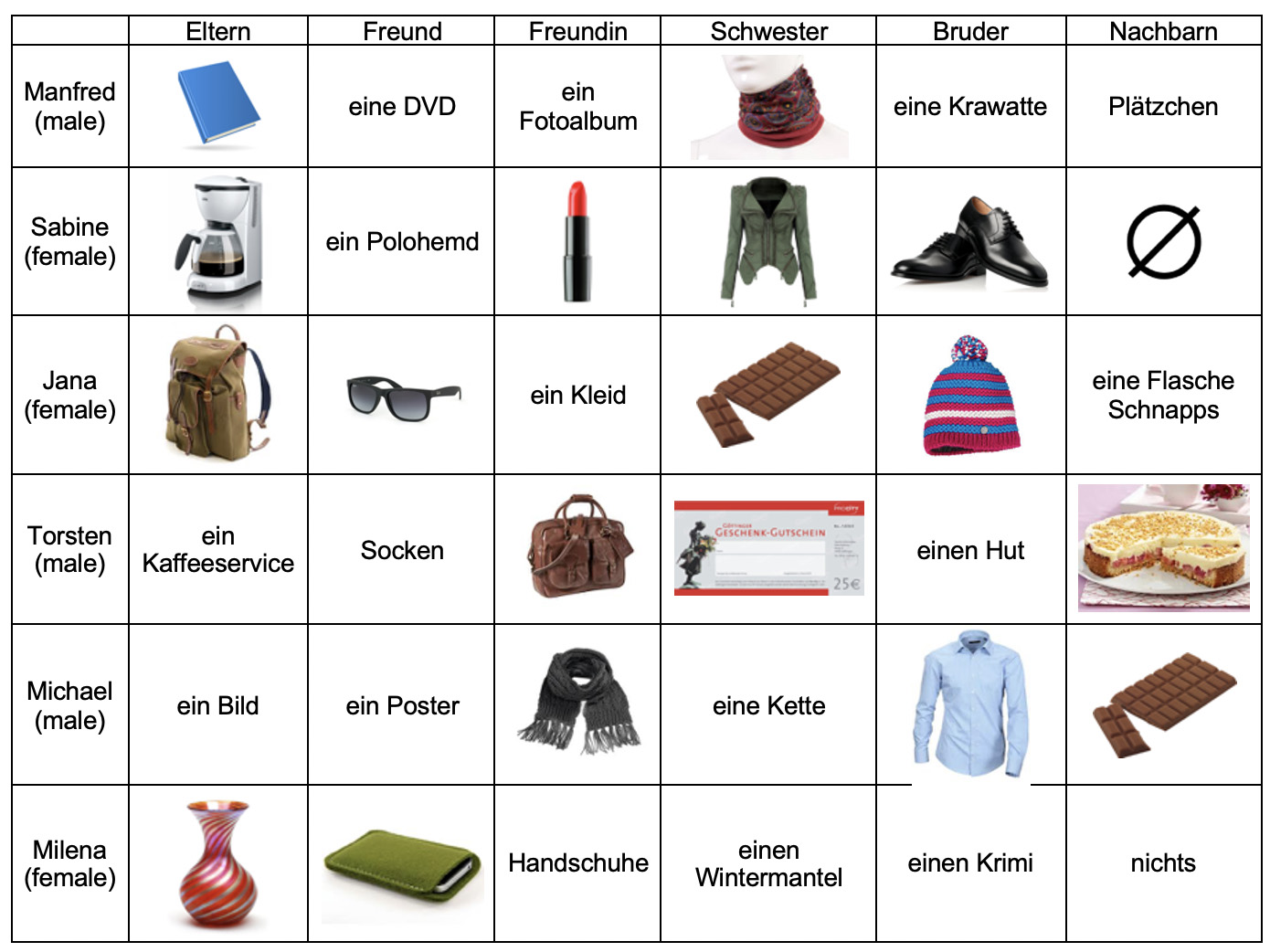| Seite 3 |
Wem gebe ich was zu Weihnachten?
"Giving" in the Broadest Sense: the Concept of the Indirect ObjectA direct object is named as such because it is a noun or pronoun that is the object of an action.Here are some examples in English:
Some verbs cannot have an object. For example, "to sleep". One cannot "sleep" something. Or "to go": One cannot "go" something. In English, the subject is easy to identify, because word order in English places the subject before the verb and the object after the verb. In German, the object can come before the verb. While it makes little sense in English to state "The tire changes the woman" or "The novel reads the student", it is perfectly grammatical to do so in German: "Den Reifen wechselt die Frau" and "Den Roman liest die Studentin".
Übung 5-3a. Identify the subjects and objects Work with a partner. Underline the subjects in the following sentences and circle the direct objects. Translate the sentences into English.
Indirect objects are the recipients of certain actions. In practical usage, indirect objects are usually people. One may begin to grasp the concept by thinking of indirect objects occuring in the "giving" verbs. In the simplest terms: A person (subject) "gives" a thing (direct object) to a person (indirect object).
Pronouns also have dative forms: Sie gibt mir (indirect object) ein Buch (direct object). "Giving" verbs include all those that indicate a subject getting or transmitting something to someone. For example, "to say": To "say something to someone", the "something" is the direct object and the "someone" is the indirect object. Other examples include "to bring" (to bring something to someone); "to buy" (to buy something for someone); "to show" (to show something to someone). In German, the dative case eliminates the need for the prepositions (to, for). English often does this as well: "I will give Mary a gift." ("Mary" is the indirect object.) See the rubrics on "Seite 11". The interrogative "whom" is wem, as in "Wem soll ich meine Handynummer geben?" (To whom should I give my cellphone number?)
Übung 5-3b. Identify the subjects and objects Work with a partner. In the following sentences, underline the subjects, circle the direct objects, check the indirect objects. Translate the sentences into English. Remember that word order is different in German.
Otherwise, the indirect object comes before the direct object. For example, for the last sentence above, if the word "Spezialpreise" is replaced by its pronoun "sie", then the word order must be: Das Hotel bietet sie seinen Gästen an. |
Übung 5-3c: Geschenke. Wem kaufe ich was zu Weihnachten? zum Geburtstag?
Construct sentences in which the giver ("Geber") is getting ("Verben") something ("Geschenk" gift) for
someone ("Empfänger" recipient) for Christmas ("zu Weihnachten") or for their birthday ("zum Geburtstag").
You should mix up the elements, so that everyone does not
have the same sentences. For example: Meine Mutter kauft meinem Bruder einen Rucksack.
Then ask your partner who they are buying things for, as indicated in the examples below. Note the partner's responses. Related quiz in BOLT.
| Verben | Geber | Empfänger | Geschenk |
|---|---|---|---|
| geben | ich | meine Freundin | ein Ring (m) |
| kaufen | mein Freund | mein Bruder | eine CD |
| schenken | mein Vater | meine Tante | ein Buch |
| schicken | meine Mutter | meine Oma | ein Computerspiel | bringen | meine Schwester | mein Nachbar (m/ -n) | ein Rucksack (m) |
- ________________________________________________________________________________
- ________________________________________________________________________________
- ________________________________________________________________________________
- ________________________________________________________________________________
- ________________________________________________________________________________
Partnerfragen Beispiele:
- Wem (for whom) kauft dein Freund etwas (something) zu Weihnachten (oder zum Geburtstag)?
- Wem gibt deine Mutter etwas zu Weihnachten (oder zum Geburtstag)?
- Wem bringst du etwas zu Weihnachten (oder zum Geburtstag)? u.s.w.
- ________________________________________________________________________________
- ________________________________________________________________________________
- ________________________________________________________________________________
- ________________________________________________________________________________
- ________________________________________________________________________________
Übung 5-3d: Über Weihnachtseinkäufe sprechen Teil A. (Teil B und Vokabular ist auf Seite 11.) Wem kaufe ich was zu Weihnachten? zum Geburtstag? Partnerarbeit.
Use nouns to ask the questions (A:) and use pronouns to answer the questions (B:). Related exercise in BOLT.
Redemittel
| A: Was schenkt Manfred seinen Eltern? B: Er schenkt ihnen ein Buch. |
A: Was gibt Torsten seinem Freund? B: Er gibt ihm Socken. |
A: Was kauft Brigitte ihrer Schwester? B: Sie kauft ihr ein Sakko. |
- (to her = ihr; to him=ihm; to them=ihnen)
- (to his=seiner (fem.), seinem (masc.), seinen (pl.)
- to her=ihrer (fem.), ihrem (masc.), ihren (pl.)

Was kaufst du deinen Eltern? Was kaufst du deinem Bruder? Was kaufst du deiner Freundin?
| Eltern | Freund | Freundin | Schwester | Bruder | Nachbarn | |
|---|---|---|---|---|---|---|
| Sie | ||||||
| Ihre Partnerin / Ihr Partner |